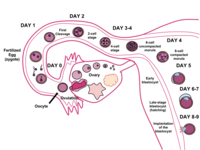
Photo from wikipedia
Infertility is one of the most common problems among couples worldwide. Recurrent pregnancy loss, premature ovarian failure, recurrent implantation failure and etc. are common high prevalence disorders in societies. We… Click to show full abstract
Infertility is one of the most common problems among couples worldwide. Recurrent pregnancy loss, premature ovarian failure, recurrent implantation failure and etc. are common high prevalence disorders in societies. We will review the definition, causes and treatment of recurrent implantation failure disorder in recent studies. Implantation refers to the attachment of the embryo to the endometrial luminal surface and recurrent implantation failure (RIF) is defined as the failure to achieve a pregnancy after transferring high-grade embryos through at least three in vitro fertilization (IVF) cycles to the endometrium. The embryo factors, maternal age, uterine factors, and multifactorial effectors have been considered as the causes of implantation failure. In this review, we aim to focus on immunological factors and cells such as pro-inflammatory cytokines and dendritic cells, macrophages, decidual and uterine NK cells, as well as Th-1 cells. There are different types of treatment according to the cause of RIF including aspirin and low-molecular-weight heparin therapy, immunosuppressive drugs, intravenous immunoglobulins, and hydroxychloroquine. Among immunological recurrent implantation failure therapy, we will discuss the intrauterine PBMC-therapy in detail.
Journal Title: Journal of reproductive immunology
Year Published: 2020
Link to full text (if available)
Share on Social Media: Sign Up to like & get
recommendations!